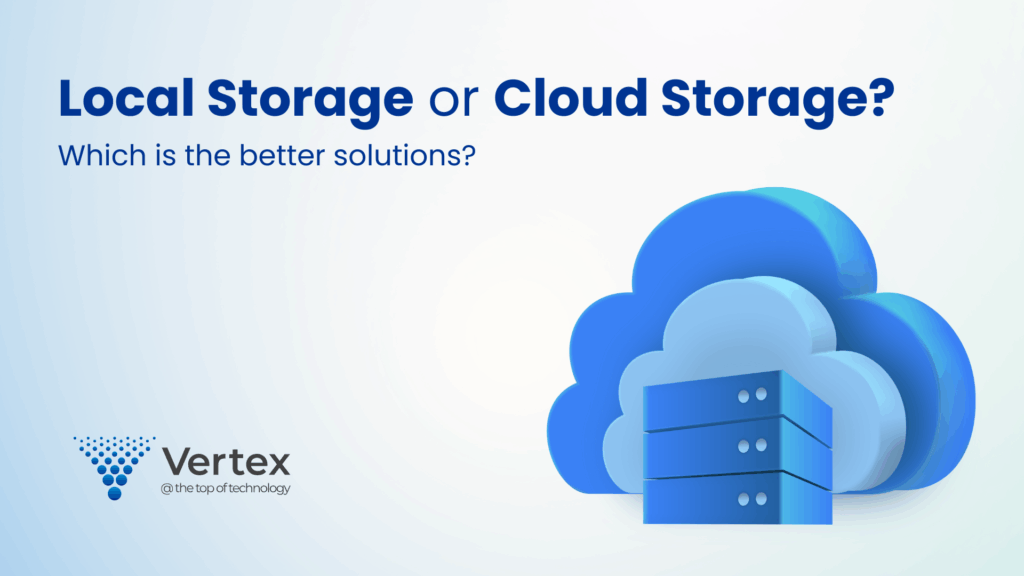As businesses generate massive volumes of data every second, choosing the right storage solution has become a defining factor in operational efficiency and success. From daily transactions and customer records to analytics and innovation, data drives growth. But the question remains: where should this data live, on local servers or in the cloud?
For years, organisations relied on local or in-house storage, maintaining their own servers and backup systems. While this approach gave them a sense of control, it also came with high costs, limited scalability, and operational challenges. As technology evolved, cloud storage emerged as a smarter, more efficient, and secure alternative.
Let’s explore why more businesses are moving to the cloud and how it’s redefining data management.

1. Scalability That Grows With You
Unlike traditional storage, where expanding capacity means purchasing new hardware, cloud storage allows you to scale effortlessly. Whether your data requirements double overnight or shrink temporarily, cloud platforms offer flexible, on-demand scalability — ensuring you only pay for what you use.
Real-world insight: The global cloud storage market was valued at USD 132.03 billion in 2024, and is projected to grow at a CAGR of about 21.7% through 2032. By 2025, enterprises are expected to store an average of 63% of their data in cloud environments. These figures show how the shift to cloud storage is not a niche move, it’s mainstream and accelerating.
2. Cost-Effective and Efficient
Maintaining in-house servers involves significant upfront investment: purchase of hardware, power, cooling, physical space, and IT manpower. Cloud storage eliminates many of these expenses with a pay-as-you-go model. Businesses save on infrastructure costs while benefitting from high performance and uptime.
Stats to support it:
– According to one survey, 94% of enterprise organisations are using cloud computing in some capacity in 2025.
– One report noted that 63% of businesses or more are heavily using the cloud, showcasing the shift from simply “having” the cloud to “living” on the cloud
3. Anywhere, Anytime Accessibility
One of the biggest advantages of cloud storage is unlimited accessibility. Your team can securely access data from anywhere, anytime, and on any device. This makes remote work, collaboration, and real-time updates easier and more productive.
As business models become increasingly hybrid or fully remote, the ability to access data seamlessly is a competitive differentiator.
4. Enhanced Security and Compliance
Leading cloud providers implement enterprise-grade security measures from data encryption and identity access management (IAM) to threat detection and compliance with international standards. In many cases, this level of protection surpasses what most local systems can offer (especially for mid-sized businesses).
Supporting data: The 2025 market report shows that 94% of organisations reported an improvement in security posture after moving to the cloud. That’s a strong signal: cloud storage isn’t just convenient — it’s increasingly trusted for security.
5. Built-In Backup and Disaster Recovery
Hardware failures, natural disasters or system outages can cripple local systems. Cloud storage ensures business continuity with automated backups, redundant data centres, and disaster recovery mechanisms so your critical data remains safe and recoverable, no matter what.
Having this resilience built in helps protect the enterprise from downtime, something costly in today’s always-on business world.
6. Minimal IT Maintenance
By moving to the cloud, businesses reduce their dependency on in-house IT resources for server upkeep, patching, hardware upgrades and physical infrastructure management. Service providers handle all infrastructure maintenance, allowing your teams to focus on strategic initiatives rather than operational tasks.
This shift enables your IT team to be more strategic, driving business innovation rather than being bogged down in routine maintenance.
7. Integration with Modern Technologies
Cloud platforms integrate seamlessly with analytics, AI, IoT, and collaboration tools — giving your business the power to extract insights, automate workflows, and innovate faster. This makes cloud storage not just a data repository but a growth enabler.
Stat highlight: The global data explosion is real, one report expects data stored in the cloud to reach 100 zettabytes globally by 2025. With that volume, traditional in-house storage just doesn’t scale as cost-effectively or flexibly as cloud infrastructure.
8. Future-Proofing Your Enterprise
Cloud storage supports not just today’s needs, but also future growth. Whether it’s new business models, remote working, multi-cloud strategies, more data from IoT and AI, or global presence, cloud infrastructure lends agility and responsiveness.
Market trend: The global cloud storage market is projected to reach upwards of USD 639 billion by 2032. That scale of investment and commitment by the industry shows that cloud storage is not a stop-gap, it’s the platform of the future.
Conclusion
Cloud storage isn’t just about where your data resides, it’s about how your business operates. It offers scalability, flexibility, resilience, and integration capabilities that local storage simply can’t match.
At Vertex Techno Solutions, we help businesses transition smoothly to the cloud with secure, efficient, and customised storage solutions that fit your business goals.
It’s time to move beyond traditional storage and step into the future of data management.